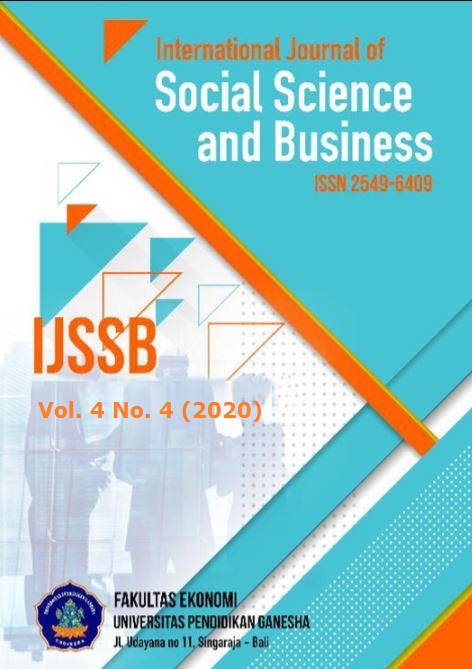Work Becomes Obligation for the Family: Analysis of Work-Family Balance on Fishermen's Wife
DOI:
https://doi.org/10.23887/ijssb.v4i4.28856Keywords:
Family, fishermens, WomanAbstract
This study aims to reveal the experiences of fishermen's wives working in balancing the dual roles of work and family, as well as the factors that can influence it. This study uses a qualitative method with a phenomenological approach. The data analysis technique in this research uses the Interpretative Phenomenological Analysis (IPA) technique. The researcher managed to conclude that there were five main themes including; a picture of life at work, the dynamics of life in the family, a picture of life undergoing multiple roles, the factors that influence the dual role of fishermen's wives and exploration of achieving balance in playing multiple roles. The role of being a housewife in a family and working to help the family economy begins when fishermen's wives choose to work after marriage. The encouragement of fishermen's wives to keep working after marriage is due to uncertain family income. This is also because their husband's catch depends on the season. Erratic season affects the fishermen's catch. One of the encouragement of fishermen's wives to work is to actualize their potential and abilities and to meet family needs
References
Al Qarasi, B. S. (2003). Seni Mendidik Islami: Kiat-kiat Menciptakan Generasi Unggul. Pustaka Zahra.
Allen, T. D., Cho, E., & Meier, L. M. (2014). Work-family boundary dinamics. Anual Review of Psychology and Organizational Behavior, 1, 99–121.
Andrade, C. (2018). Work-Life Balance: Demands, Resources and Reconciliation Strategies. DEDiCA, 1(8), 117–130. https://doi.org/10.30827/dreh.v0i8.6913
Anoraga, P. (2009). Psikologi Kerja. Rineka Cipta.
Ariwidodo, E. (2016). Pekerja Perempuan Pesisir Sektor Pembudidayaan Rumput Laut Dalam Perspektif Analisis Gender di Pakandangan Tengah Kabupaten Sumenep. Nuansa, 13(2), 329–356. https://doi.org/10.19105/nuansa.v13i2.1103
Burmana, Lovely, B., & Faturochman. (2010). Pengaruh Kepribadian Tangguh Dan Konflik Peran Ganda Terhadap Kinerja. Universitas Gajah Mada.
Farihah, I. (2015). Etos kerja dan kuasa perempuan dalam keluarga: Studi kasus keluarga Nelayan, di brondong, Lamongan, Jawa Timur. PALASTREN, 5(1).
Febi, F., & Budiman, I. (2017). Pembangunan Ekonomi Keluarga Perspektif Islam (Studi Analisis Keluarga Nelayan Kota Lhokseumawe). J-EBIS (Jurnal Ekonomi Dan Bisnis Islam), 1(1). https://doi.org/10.32505/jebis.v1i1.74
Gauche, C., Beer, L. T. de, & Brink, L. (2017). Managing employee well-being: A qualitative study exploring job and personal resources of at-risk employees. South African Journal of Human Resource Management, 15(1), 1–13. https://doi.org/10.4102/sajhrm.v15i0.957
Greenhaus, J. H., & Allen, T. D. (2011). Work-family balance: A review and extension of the literature. Handbook of Occupational Health Psychology (2nd ed.). American Psychological Association.
Gunarsa, S. D., & Gunarsa, Y. S. D. (2000). Psikologi Praktis Anak, Remaja dan Keluarga. PT BPK Gunung Mulia.
Handayani, A., Maulia, D., & Yulianti, P. D. (2012). Kinerja Dosen Berdasarkan Konflik Kerja Keluarga dan Motivasi berprestasi.
Herdiansyah, H. (2016). Gender Dalam Prespektif Psikologi. Salemba Humanika.
Hidayati, N. (2015). Beban Ganda Perempuan Bekerja. MUWAZAH, 7(2).
Kumalasari, B., Herawati, T., & Simanjuntak, M. (2018). Relasi Gender, Tekanan Ekonomi, Manajemen Keuangan, Strategi Nafkah, dan Kualitas Hidup pada Keluarga Nelayan. Jurnal Ilmu Keluarga Dan Konsumen, 11(2), 108–119. https://doi.org/10.24156/jikk.2018.11.2.108
Lazar, I., Osoian, C., & Ratiu, P. (2010). The role of work-life balance practices in order to improve organizational performance. European Research Studies, 13(1), 201–214.
Lubis, A. S. (2018). Pembentukan Jiwa Entrepreneurship Bagi Para Istri Nelayan Melalui Pelatihan Pembuatan Greeble. Dinamisia, 2(1), 22–31. https://doi.org/10.31849/dinamisia.v2i1.805
Mulyadi, A. (2011). Perempuan Madura pesisir meretas budaya mode produksi Patriarkat. Karsa, 19(2).
Murtiningrum, A. (2005). Analisis pengaruh konflik pekerjaan-keluarga terhdap stres kerja dengan dukungan sosial sebagai variabel moderasi. Universitas Diponegoro.
Najmi, N., & Fitrisia, A. (2019). Peranan Perempuan Nelayan Kota Padang dalam Membantu Ekonomi Keluarga. Diakronika, 19(1), 1–20. https://doi.org/10.24036/diakronika/vol19-iss1/75
Putrianti, F. C. (2007). Kesuksesan peran ganda wanita karis ditinjau dari dukungan suami, optimisme, dan strategi coping. Indigenious, Jurnal Ilmiah Berkala Psikologi, 9(1), 3–17.
Saleha, Q., Hartoyo, H., & Hastuti, D. (2008). Manajemen Sumberdaya Keluarga: Suatu Analisis Gender Dalam Kehidupan Keluarga Nelayan di Pesisir Bontang Kuala, Kalimantan Timur. Jurnal Ilmu Keluarga Dan Konsumen, 1(2), 118–130. https://doi.org/10.24156/jikk.2008.1.2.118
Sarafino, E. P., & Smith, T. W. (2011). Health Psychology: Biopsychosocial Interactions (7th ed.). John Willey & Sons Inc.
Smith, J. A., Flowers, P., & Larkin, M. (2009). Interpretative Phenomenological Analysis. SAGE Publications, Inc.
So, J., Parsons, A., & Yap, S. (2013). Corporate branding, emotional attachment and brand loyalty: the case of luxury fashion branding. Journal of Fashion Marketing and Management: An International Journal, 17(4), 403–423. https://doi.org/10.1108/JFMM-03-2013-0032
Sugiyono. (2011). Metode Penelitian Kuantitatif, Kualitatif, dan R&D. Alfabeta.
Tylor, S. E., Peaplau, L. A., & Sears, D. O. (2009). Psikologi Sosial. Kencana.
Valk, R., & Srinivasan, V. (2011). Work-Family Balance of Indian Women Software Professionals: A Qualitative Study. IIMB Management Review, 23(1). https://doi.org/10.1016/j.iimb.2011.01.006
Widyaningsih, E., & Muflikhati, I. (2015). Alokasi Pengeluaran Dan Tingkat Kesejahteraan Keluarga Pada Keluarga Nelayan Bagan. Jurnal Ilmu Keluarga Dan Konsumen, 8(3), 182–192. https://doi.org/10.24156/jikk.2015.8.3.182
Zuhriah, Z. (2016). Kuliwa: A Cultural Identity of the Local People of Mandar, West Sulawesi. Dinika: Academic Journal of Islamic Studies, 1(2), 165–175. https://doi.org/10.22515/dinika.v1i2.127











